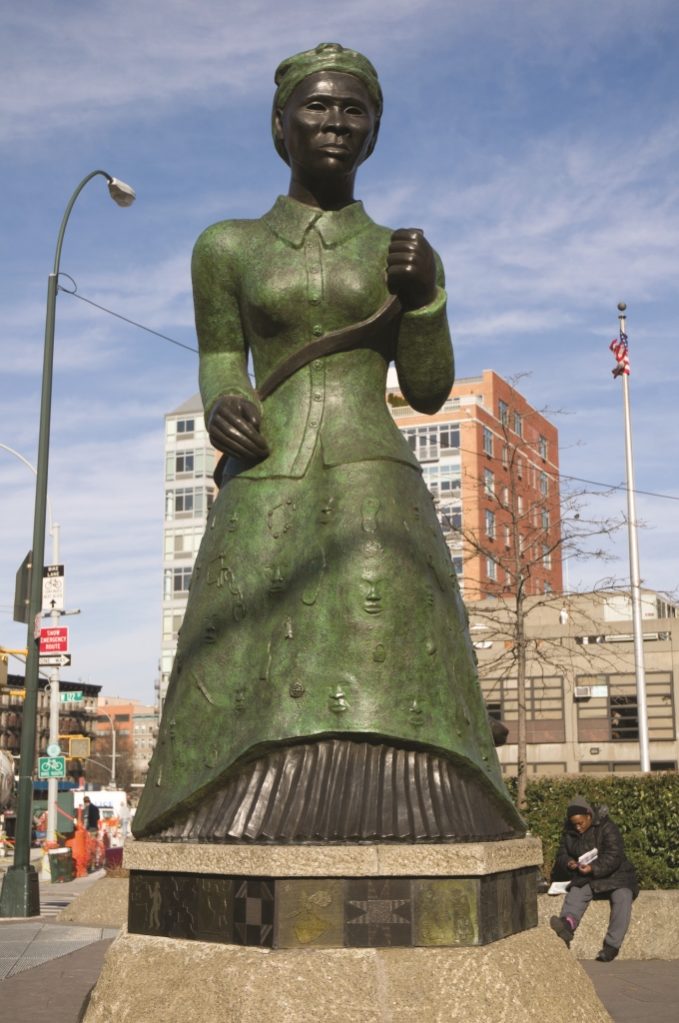While on my first late Monday morning subway ride, from 34th Street to 125th Street in Harlem, New York, it felt like I was traveling from Soweto to Park Station in Johannesburg, with a few notable exceptions.

Just like back home, the coach was jam-packed, but there were no young men train surfing and the construction workers wore clean and bright work suits, without the odor that comes with long hours and back-breaking work. Some passengers jammed to music coming from their headphones; the dapper executives were fixated on their iPads held in one hand while the other grasped the overhead rails. Initially, feeling slightly paranoid, I was vigilant and clung to my valuables. After a while, I loosened up as I realized how chilled my fellow passengers were.
Amid the frantic activity of New York, I was flooded with memories of Johannesburg as three African women sat opposite me. The women, each of them hawkers, had two oversized plastic bags between their legs. They wore identical black headscarves and matching flat shoes. Taking no notice of the commuters squeezed around them, the women chatted and passed kente cloth, a traditional Ghanaian interwoven material, among themselves. Kente has become an integral part of African-American graduation attire.
While a handful of passengers were annoyed, the hustle of the hawkers, and the ‘gibberish’ coming from their tongues, left the rest amazed. I came to realize that the women left their village in Africa for the dream of a better life in the land of the free. Not a word of English was used in their conversation, but they know the basics of the language to make ends meet. I have met many other African foreigners like them who told me they learned English in the United States (US).
Loading...
Soon after, I stumbled upon a 10-foot bronze statue of Harriet Tubman, the African American anti-slavery activist. Like the hawkers on the train, Tubman’s head was covered with a head wrap. Unlike the hawkers, Tubman was born into slavery in Maryland around 1820. In her late 20s, Tubman, along with her two brothers escaped the plantations; her brothers got cold feet and returned, leaving her to flee to the free state of Pennsylvania alone.
Later on, Tubman returned to Maryland to free slaves with the help of other freed African Americans. She carried out her mission armed with a shotgun. She never fired the gun because nobody tried to stop her. For her work, Tubman was called ‘Moses’ by her people.
Once slavery was abolished, Tubman joined the African Methodist Episcopal Zion Church. The former slaves took African Methodism across the Atlantic to Liberia and Sierra Leone, and later southern Africa.
Tubman’s statue, on Frederick Douglass Boulevard in Harlem, overlooks an array of African restaurants in an area dubbed ‘Small Africa’. The owner of one of these eateries, Patisserie des Ambassades, is Gorgui N’doye. This Senegalese engineer opened the first restaurant in the south Harlem 16 years ago, with less than 10 employees. Today, Patisserie des Ambassades has 50 staff and opens for 20 hours every day.
N’doye started the restaurant in 2001 when Harlem was notorious for being a gangster’s paradise. The area underwent gentrification in 2005 and business started to boom.
N’doye has since returned to Senegal where has expanded his business to exporting peanuts to Asia and South Africa. In his absence, Patisserie des Ambassades is managed by another Senegalese, Ahmadou Ndiaye Jean.
Harlem’s facelift, however, hasn’t benefited everyone. Eric Fraska, a 31-year-old Liberian financier at MoneyGram in New York, laments the displacement of black folk due to the rising cost of living in the area.
Fraska came to the US as a 20-year-old to study. Over the years, he witnessed a lot of change. Like Ndoye, Fraska is saving money to start a business in Africa. He says he’s certainly going back.
“My education and skills are no longer needed here. There’s nothing more to do here. Africa is the future,” Fraska says over a frothing cappuccino.
I have no doubt the next time I catch up with Fraska will be in either Johannesburg or Monrovia.
Loading...
